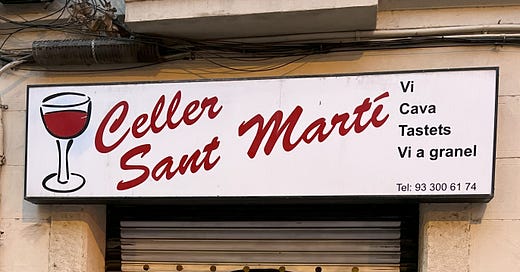In Barcelona, the approach to wine differs distinctly from the way Les and I, as well as our friends and family members, have approached it over the last roughly forty years (at least on my part).
The Now Closed Celler Sant Marti: Great Catalan Vintages (Now the Site of a VR Gaming Establishment…Boo!)
Wine drinking in the US, at least in my estimation, is still viewed mainly as a serious, if not a highbrow pursuit. While not seen as much as a restricted activity as it might have been in the mid twentieth century, wine drinkers are perceived as possessing a certain cachet, even as it may be have migrated from the rarified penthouses and mansions of the wealthy to the middle class suburban backyard barbecues. Case in point: a few years ago when Les attended a work outing at a Top Golf location in Scottsdale, he ordered a glass of wine. As a sporting establishment known mostly for golfing devotees it is certainly not celebrated for having a first-rate wine selection. Yet during the get-together, one of his co-workers teased him and his choice of beverage as “upscale.” I’ve often thought of that story when perusing the wine aisle of the Fry’s Marketplace on Shea Boulevard with its bottles and boxes of wine brands that might not even be fit for cooking.
Naturally, this assessment isn’t helped by the wine industry. I’m not an expert in that field and I know that it has become much more “democratic” in recent years, particularly in Arizona (more on that in a bit), but the so-called wine press doesn’t help its case. First, to tell you where I stand, I am all for the democratization of wine. Wine has historically been as much a drink for the masses as much as beer or whiskey. Yet, reading publications such as The Wine Advocate or The Wine Spectator, one would come away with the reinforced opinion that wine is for elitists that might live in rarified, well-heeled communities. Les and I were avid readers of The Wine Spectator for a number of years. Over time, we grew tired of the continued parade of covers featuring rather stoic multi-generational winemakers or celebrities who have decided to buy wineries (out of boredom, maybe, or decreasing success, perhaps?)1
Additionally, and here’s where the exclusivity really shines through, every other issue seemed to feature only one of the three largest wine-growing countries in the world: France, Italy, or California. It was as if there were no other place in the world where wine was produced. Occasionally, there’d be a feature on Australia, South Africa, Argentina, or Washington state. Nevertheless, the editors and publishers appeared to be fixated on a limited number of growing regions.
This is another area where I believe the democratization of wine needs to be promoted. Not only is wine a drink for everyone, but it is also a drink that can and is produced in much of the world and in all fifty states. I have since canceled my subscription to The Wine Spectator, or it is entirely possible that they might have done so, but why not a feature article on a state or country that is not a well-known as the so-called “Big Three”? a cover story about Georgia (the country), Japan’s Island of Hokkaido, or Virginia’s Loudon County might be interesting and encourage growth in the region’s wines.
Circling back to Arizona, I think the state has done an excellent job promoting its wine industry, despite the lack of publicity. The Arizona Vignerons Alliance has worked hard to not only publicize the state’s wines but also to encourage educating and training people to work in all aspects of the industry. Whenever we can, Les and I have always bought and enjoyed Arizona wines and encouraged our friends to do the same. We attended wine festivals that featured Arizona wines and tried new wineries and varietals. We have also traveled to Arizona vineyards, for the wine, light fare, and atmosphere. To top it off, there is nothing pretentious or pricey about the experience.
Hidden Track Bottle Shop and Wine Bar: One of Our Favorite Haunts in Phoenix (Try The Flammekueche!)
So what does my commentary about the US wine industry have to do with Barcelona? Here, I noticed that wine drinking takes on a more egalitarian flair than in the United States. Wine is accessible in so many places by the bottle or by the glass. If we are making dinner and would like a red or white to accompany our meal, it’s only a matter of an elevator ride downstairs to the bodega next door for a bottle from their small but ample selection. If we want to eat out, any restaurant from the smallest tapas bar to the fine dining establishments will serve wine by the bottle or glass. Not to mention the wine bars and other drinking establishments will always offer a wide variety of wines by the glass or bottle on their drink menus. Wine can be purchased easily at any supermarket or grocery store (provided the buyer is 18 or older) in addition to the numerous wine retailers and spirits shops throughout the city.
Barrel Vins and Tapas: One of Our Favorite Haunts in Barcelona (The Milaneses are the Best!)
I’ve heard it said on more than a few occasions that Europeans, especially the French and Italians drink wine with most every meal. From what I’ve observed, the same must hold true of the citizenry of Barcelona. When Les and I have eaten out, we frequently spot wine (and sometimes beer as well) at lunch or dinner tables in most dining establishments. It is also common to see people stop at a bar just for a glass of verdejo, rioja, or even cava while running errands. This might seem to paint a picture of rampant alcoholism. Yet, I’ve rarely witnessed public drunkenness on the scale that I’ve seen in the United States or anywhere else for that matter. Les and I have regularly avoided Old Town Scottsdale on Friday and Saturday nights, especially during tourist season. The debauchery rivals that of New Orleans during Mardi Gras. When I worked at the local hospital, I dreaded weekends since the number of alcohol-related traumas that we’d experience had a tendency to strain resources to the breaking point. In Barcelona, the difference is not just a perception but can be confirmed by a recent study. Just last month, the World Health Organization showed a drop in alcohol consumption in the EU by 0.5 liters and 0.3 liters per person throughout Europe overall in the last 10 years.2 In Spain the drop was even more drastic: 2.0 liters per capita or more than 20 %.3 One of our Spanish teachers, Bea, in her wine tasting class makes the point of saying unequivocally that in Spain, wine is food.5 This seems to give credence to the idea that wine is far from a mind altering substance and mostly a means to encourage conversation and conviviality.
I don’t promote drinking wine everyday or all day. I follow the dictum of all things in moderation. But while I do consider wine to have a time-honored place in the pantheon of all sorts of cuisines and cooking styles. Wine also is a way for us to bond with each other and form connections in addition to and to balance the meals we share. It should not be something to lock away for special events or kept as an investment. It should be enjoyed under the appropriate circumstances. In Barcelona, I see how the locals do that every day. Whether at mealtimes, socializing or just relaxing, they will make wine part of that event to complement the food or to engage with others. Wine proves to be special for everyone and not the exclusive domain of the privileged few.
Les and I Enjoying Ourselves at the Poble Nou Wine Festival in May (Soon to be Our New Neighborhood)
Works Cited
1 Recent issues in the last few years featured wineries owned by Jon Bonjovi and Sting. They’re decent enough pop/rock artists but definitely past their prime.
2,3,4 Yanatma, Servet. “Which country is home to Europe's heaviest drinkers?” euronews.com, 21 Aug. 2024, https://www.euronews.com/health/2024/08/21/dry-january-where-in-europe-is-drinking-alcohol-getting-worse-and-which-countries-have-cut#:~:text=There%20is%20a%20gradual%20decrease,a%2023%20per%20cent%20decrease. Accessed 19 Sep. 2024.
5 Cejudo-Gumiel, Beatriz. “Wine Workshop.” Sponsored by World Class Barcelona Language School, 18 April 2024, Barcelona, Spain.







